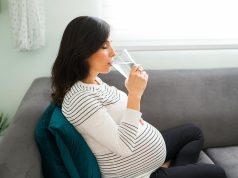Live-birth rate did not increase for euthyroid women with thyroid peroxidase antibodies before conception
TUESDAY, March 26, 2019 (HealthDay News) — For euthyroid women with thyroid peroxidase antibodies and a history of miscarriage or infertility, levothyroxine does not result in an increased rate of live births versus placebo, according to a study published online March 23 in the New England Journal of Medicine to coincide with presentation at the annual meeting of The Endocrine Society, held from March 23 to 26 in New Orleans.
Rima K. Dhillon-Smith, M.B., Ch.B., Ph.D., from the University of Birmingham in the United Kingdom, and colleagues conducted a double-blind, placebo-controlled trial involving 952 euthyroid women with thyroid peroxidase antibodies and a history of miscarriage or infertility. Participants were randomly assigned to receive either 50 µg once daily levothyroxine (476 women) or placebo (476 women) before conception through the end of pregnancy. The follow-up rate for the primary outcome of live birth after at least 34 weeks of gestation was 98.7 percent.
The researchers found that 56.6 and 58.3 percent of women in the levothyroxine and placebo groups became pregnant, respectively. The live-birth rate was 37.4 and 37.9 percent in the levothyroxine and placebo groups, respectively (relative risk, 0.97; 95 percent confidence interval, 0.83 to 1.14; P = 0.74; absolute difference, −0.4 percent; 95 percent confidence interval, −6.6 to 5.8). No significant between-group differences were seen in other pregnancy outcomes.
“Levothyroxine treatment, started before pregnancy, in women with normal thyroid function and thyroid peroxidase antibodies who have a history of miscarriage or infertility, does not improve the chances of live birth,” Dhillon-Smith said in a statement. “We were surprised because previous small studies suggested there could be a benefit with levothyroxine treatment in women with thyroid antibodies.”
Copyright © 2019 HealthDay. All rights reserved.








